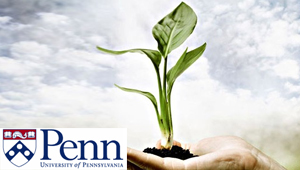UPenn Students Save Lives By Growing Plants
By Nora Al Baghdadi
Delivering the drugs that can potentially save lives is, at this moment, limited to popping a pill or weathering a sometimes terribly painful injection. If University of Pennsylvania’s Henry Daniell has his way, though, that could change in the very near future. He, along with UPenn students, are furthering his key research and taking it to the next level.
In addition to being the director of translational research within UPenn, Daniell is also a professor with the university’s School of Dental Medicine, teaching both pathology and biochemistry. His area of expertise centers around new and innovative ways of delivering vaccines and drugs to people. His focus is doing so via the lowly lettuce leaf.
The South Bank campus of UPenn holds a number of old buildings that used to be factories. Today, they stand in front of state-of-the-art greenhouses that are devoted to bringing Daniell’s research out of the lab and into the clinics where they can help people receive life changing medications and vaccinations. These greenhouses cost $2 million and hold the top innovations designed to grow healthy plants.
Precision is the key with the nurturing these plants receive. Watering is not left to happenstance as the built-in drip irrigation is designed to deliver just the right amount of liquid at the right time. Both the temperature and the humidity are monitored and adjusted to exacting measurements. Regulating them is possible from remote locations. The sometimes long and brutal winters of Pennsylvania are not an issue for these plants. If they do not receive enough sunlight because of snow cover, cloudy days or the short days of winter, ceiling lights and panels that automatically adjust provide just the right amount of solar radiation to ensure that the plants thrive.
Clearly, Daniell’s approach is working. Thus far, his research has shown to be effective in delivering therapeutics and vaccines that are plant-based and able to treat nearly 30 conditions. These range from autoimmune diseases, such as hemophilia and diabetes, to infectious diseases such as malaria, anthrax and cholera.
While this research has a number of advantages such as not requiring refrigeration so they are shelf-stable, being easy to grow, less likely to be reactive when compared to injections that are egg-based and being fairly easy to grow, the most exciting advantage they offer is a significant cost savings. Daniell believes that if the technology is there, it should be affordable enough so that everyone who needs it, has access to it.
The current system for healthcare, though, puts an exorbitant price tag on such treatments. As Daniell points out, some popular cancer drugs, such as Interferon, have a price tag of between $30,00 to $40,000 for a four month treatment. For the 33% of the world’s population that makes less than two dollars a day, this type of lifesaving treatment is not even possible. Morally, it is wrong to price these types of medications so high that a significant segment of the global population can never hope to be able to enjoy its benefits.
Trials on humans for the delivery of medications using plant-based means could begin early in 2015. This means that even those remote areas that do not have access to refrigeration or electricity can still distribute lifesaving medications to their populations within a few years. The pharmaceutical companies have expressed interest in an article that Daniell will publish soon since he has circumvented one of the most dangerous complications that can occur when treating hemophilia. It is hoped that the involvement of the pharmaceutical companies does not cause the price of the treatments to skyrocket.
Search
News

رئيس جامعة الناصر الاستاذ الدكتور عبدالله حسين طاهش يقوم بزيارة تفقدية للجان والقاعات الامتحانية الخاصة بكلية الهندسة وعلوم الحاسوب الاثنين 24 فبراير 2025
قام رئيس الجامعة الاستاذ الدكتور عبدالله حسين ط...
جامعة الناصر تنظم ورشة حول التهيئة الرمضانية لمنتسبيها
نظمت جامعة الناصر صباح اليوم الأثنين 25 شعبان 1...
اختتام المؤتمر العلمي الأول للجامعات اليمنية في صنعاء
اختتم اليوم في العاصمة صنعاء، أعمال المؤتمر الع...
لليوم الثاني على التوالي، استمرار أعمال ونقاشات المؤتمر العلمي الأول للجامعات اليمنية.
تستمر في العاصمة صنعاء لليوم الثاني على التوالي...
بمشاركة جامعة الناصر وبحضور رسمي رفيع انطلاق المؤتمر العلمي الأول في صنعاء
صنعاء 20 شعبان 1446 هجرية الموافق 18 فبراير 202...

